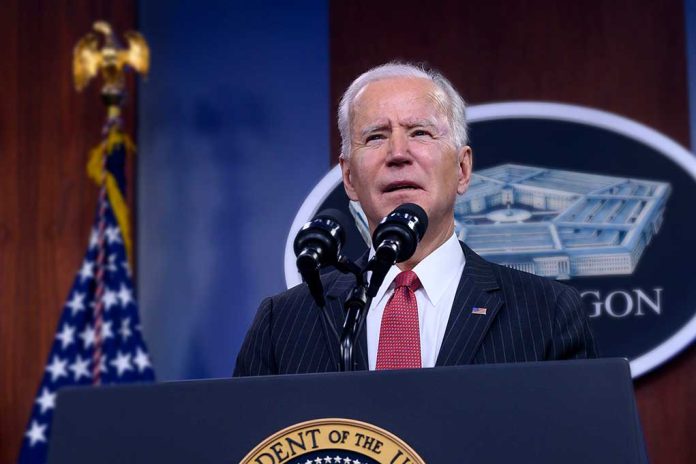
The Biden administration faces harsh criticism for its delayed response to the genocide in Sudan, as the U.S. finally accuses the Rapid Support Forces (RSF) of atrocities.
At a Glance
- U.S. declares genocide in Sudan, accusing the RSF of systematic atrocities
- Secretary of State Blinken highlights ethnically targeted violence in Darfur
- Biden administration criticized for waiting until the end of the term to make declaration
- Sanctions imposed on RSF leader and associated companies
- Sen. Jim Risch argues earlier action could have saved lives and maintained U.S. influence
U.S. Declares Genocide in Sudan
The United States has officially accused the Sudanese paramilitary group, Rapid Support Forces (RSF), of committing genocide in Sudan’s ongoing civil war. This declaration, made by Secretary of State Antony J. Blinken, marks a significant yet delayed acknowledgment of the dire crisis unfolding in the region. The announcement comes amid growing criticism of the Biden administration’s handling of the situation, particularly the timing of this crucial designation.
Secretary Blinken’s statement highlighted the systematic nature of the violence perpetrated by the RSF and allied militias. The accusations include the targeted murder of men and boys, including infants, based on ethnicity, as well as the deliberate targeting of women and girls for assault and other forms of violence. The RSF has also been accused of attacking fleeing civilians and preventing access to lifesaving supplies.
Biden administration sounds alarm about Sudan genocidehttps://t.co/N2BuOL31MK pic.twitter.com/gULSImcKgq
— Voice of America (@VOANews) January 9, 2025
Sanctions and International Response
In response to these atrocities, the U.S. Treasury Department has imposed sanctions on RSF leader Gen. Mohamed Hamdan, also known as Hemedti, and seven companies in the United Arab Emirates (UAE) accused of trading weapons and gold on his behalf. These actions aim to hold accountable those responsible for human rights violations in Sudan and disrupt the financial networks supporting the RSF’s activities.
The UAE has denied supporting any warring parties in Sudan and emphasized its focus on humanitarian efforts. However, the U.S. Treasury Department remains committed to its sanctions, viewing them as a crucial step in addressing the ongoing crisis.
The bipartisan resolution was introduced in the House again a day before the Joe Biden administration declared a genocide in Sudan. https://t.co/csI9zkZEq6
— HuffPost (@HuffPost) January 8, 2025
Criticism of the Biden Administration’s Timing
The Biden administration’s decision to declare genocide in Sudan has been met with significant criticism, particularly regarding the timing of the announcement. Senator Jim Risch, a prominent voice on foreign affairs, has slammed the administration for waiting until the end of President Biden’s term to make this crucial declaration.
“The Biden administration said it has determined that Sudan’s paramilitary group, the Rapid Support Forces, is committing genocide in the country’s ongoing civil war.” – NPR
Critics argue that earlier action could have saved lives and maintained U.S. influence in the region. The delay in recognizing the gravity of the situation has potentially exacerbated the humanitarian crisis, with widespread famine and millions in need of assistance. The U.S. Special Envoy for Sudan has defended the administration’s approach, citing the complexity of making atrocity determinations. However, this explanation has done little to quell the criticism from both domestic and international observers.
Implications and Future Actions
The genocide declaration echoes a similar U.S. finding in 2004 against the Janjaweed militias in Darfur, highlighting the recurring nature of such crises in the region. As the international community grapples with the implications of this declaration, there are calls for more robust and timely interventions in future conflicts. The situation in Sudan serves as a stark reminder of the importance of swift action in the face of humanitarian crises and the potential consequences of delayed responses by global powers.
As the Biden administration faces scrutiny over its handling of the Sudan crisis, the focus now shifts to the effectiveness of the imposed sanctions and the potential for further international action to address the ongoing genocide and humanitarian crisis in the region.
Sources:
- U.S. Declares Genocide in Sudan. Critics Say Biden Acted Too Late. – WSJ
- Sudanese Paramilitary Group Committed Genocide, U.S. Says
- U.S. declares genocide in Sudan : NPR
- Biden Admin slammed for ‘waiting’ to declare genocide in Sudan | Fox News



